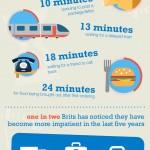NEWS COPY
Brits have had their patience put to the test in a new study exploring how tolerant we are as a nation.
The average Brit loses patience after five minutes waiting to be served at a bar, 13 minutes waiting for a delayed train and 18 minutes for a friend to call us back, a new study has revealed.
Research into the limits of British patience found we ‘draw the line’ at waiting more than a year and three quarters for a pay rise, will sit in traffic for 13 minutes before getting angry and expect a web page to load in under ten seconds.
Our tipping point is also waiting any more than 24 minutes for food being brought out after first ordering, results showed.
The study of 2,000 people, which was commissioned by parcel & postage comparison website Interparcel.com, found the average person will wait up to 16 seconds for an online video to buffer and expect a parcel ordered online to arrive within four and a half days.
We’re also prepared to wait 17 minutes for a date running late to arrive at a pre-arranged venue, but expect to hear back from them within two days afterwards if love is to blossom.
HOW LONG DOES OUR PATIENCE LAST?
Waiting for a web page or link to load – 10 seconds
Waiting for a video to buffer – 16 seconds
Waiting for a drink at a bar – 5 minutes
Phoning a utility or large company – 8 minutes
Queuing for train tickets – 9 minutes
Being kept on hold for doctors – 9 minutes
Queuing to post a letter- 10 minutes
Putting up with a screaming child in a restaurant – 10 minutes
Delayed train – 13 minutes
Sitting still in traffic – 13 minutes
Waiting for a bus – 13 minutes
Buying music tickets online – 17 minutes
Date running late – 17 minutes
Friend says they’ll call you right back – 18 minutes
Waiting for food at a restaurant – 24 minutes
Friend to text back – 18 hours
Hearing from someone after a date – 2 days
Waiting for a parcel to be delivered – 4.5 days
Working without a pay rise – 1 ¾ years
Yesterday a spokesman for Interparcel, said: ‘’The results provide a revealing insight into how long our patience lasts and when it really gets tested.
‘’It’s interesting to see the limits in the various scenarios and how strong British patience really is and we live in an age where things move fast.
‘’The average person expects good, reliable service quicker than ever before and the results show expectations are reasonable. Frustration kicks in when there’s a lack of communication or poor processes.’’
The study also found being kept on hold on the phone more than eight minutes to a big corporation sees our patience plummet.
And when faced with a screaming child in a restaurant, we can keep up a good mood for a maximum of ten minutes, results showed.
The study also settled the age old debate of what an appropriate length of time is to get ready – men are happy to wait 27 minutes for a partner to get ready before the impatience kicks in, it emerged.
Results showed patience levels are dropping and perhaps gone are the days of the British stiff upper lip – a third now describe themselves as someone who has no patience generally.
While one in two Brits has noticed they have become more impatient in the last five years according to the data.
And those we love most are the more trying, results showed – respondents were most likely to cite their family as the biggest test of their patience, followed by a partner and ‘the boss’ in third.
In fact three quarters feel because of the internet we demand things much more quickly, while more than half thought we get less free time and are more precious about wasting it.
Men are more likely to complain and have launched four complaints in the last 12 months compared to women’s three on average.
Men were also more likely to produce an angry tweet or call the company directly if on the receiving end of poor treatment.
But women more commonly vented on Facebook, wrote more angry letters and left more complaints on company websites.
While women were also much more likely to fume silently if annoyed, results showed.
The Interparcel spokesman added: ‘’Even in our personal lives we expect quicker responses and regular contact.
‘’The internet means we expect more from businesses and services we use where up to the minute information and regular updates is crucial in ensuring those expectations are met.
“As the study revealed queuing up to post a parcel is something that can get frustrating very quickly. Choosing a courier that will collect parcels from home, work or another address at a time that suits you could make all the difference.
‘’ At Interparcel.com we aim to save customers both time & money, whilst offering a far greater level of convenience where a parcel can be booked for collection 24 hours a day 7 days a week.’’
ENDS




